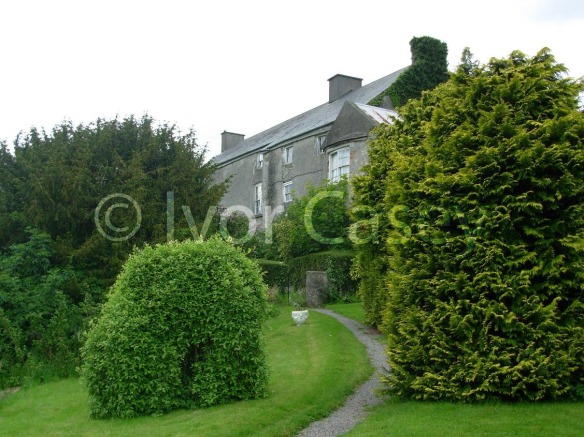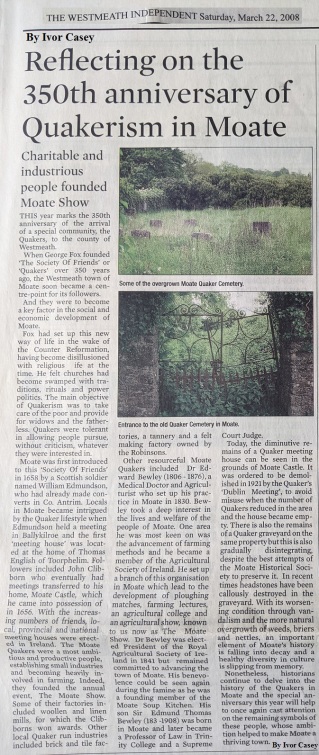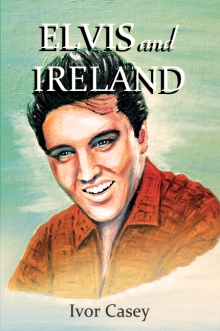WHILE the midlands has often become a side stepped region throughout Ireland, its history has included important developments in the name of The Quakers, who spear-headed production in Co. Offaly and Co. Westmeath. It was firstly in Moate, Co. Westmeath where the progression of this community began to flourish and see the earliest advancements in rural Ireland over three and a half centuries ago.
When George Fox founded ‘The Society Of Friends’ or ‘Quakers’ over 350 years ago, the Westmeath town of Moate soon became a centre-point for its followers. Fox had set up this new way of life in the wake of the Counter Reformation, having become disillusioned with religious life at the time. He felt churches had become swamped with traditions, rituals and power politics. The main objective of Quakerism was to take care of the poor and provide for widows and the fatherless. It was ensured that all members practised justice, equity and consolation. Quakers were tolerant in allowing people pursue, without criticism, whatever he or she was interested in.

Moate Castle, Moate, Co. Westmeath (Photo: Ivor Casey)
Moate was first introduced to this ‘Society Of Friends’ in 1658 by a Scottish soldier named William Edmundson, who had already made converts in Co. Antrim. Locals became intrigued by the Quaker lifestyle when Edmundson held a meeting in Ballykilroe and the first ‘meeting house’ was located at Toorphelim. Followers included John Clibborn who eventually had meetings transferred to his home, Moate Castle, which he came into possession of in 1656. It was the town of Moate where distant visitors, which included Americans, would come to, in search of information about Quakers in Ireland and nearby countries. From here, Quakerism extended to neighbouring counties such as Offaly. With the increasing numbers of friends, local, provincial and national meeting houses were erected in Ireland.
The Midlands Quakers were a most ambitious and productive people, establishing small industries and becoming heavily involved in farming and founded agricultural shows. Some of their factories included woollen and linen mills, brick and tile factories, a tannery and a felt making factory. They were also involved in banking, engineering and shipbuilding as well as producing jams, biscuits and tobacco and the famous Bewleys cafes. A major Quaker run factory was the Goodbody factory in Clara, Co. Offaly which was a flour mill and jute processor.
One particular resourceful Quaker was Dr. Edward Bewley (1806 – 1876), a Medical Doctor and Agriculturist who set up his practice in Moate in 1830. One area he was most keen on was the advancement of farming methods and he became a member of the Agricultural Society of Ireland. He set up a branch of this organisation in Moate which lead to the formation of ploughing matches, farming lectures, an agricultural college and an agricultural show. Dr. Bewley was elected President of the Royal Agricultural Society of Ireland in 1841. His benevolence could be seen during the famine as he was a founding member of the Moate Soup Kitchen. His son Sir Edmund Thomas Bewley (1837 – 1908) was born in Moate and later became a Professor of Law in Trinity College and a Supreme Court Judge.
The Quakers are still very much in existence, with meeting houses all around the country. However, other than one active meeting house in Edenderry in Co. Offaly at present and none in Co. Westmeath, the midlands have lost a symbol of their prosperity. Today, the diminutive remains of a Quaker meeting house can be seen in the grounds of Moate Castle. It was ordered to be demolished in 1921 by the Quaker’s ‘Dublin Meeting’, to avoid misuse when the number of Quakers reduced in the area and the house became empty. There is also the remains of a Quaker graveyard on the same property but this is also gradually disintegrating, despite the best attempts of the local Historical Society to preserve it.
With its worsening condition through vandalism and the more natural overgrowth of weeds, briers and nettles, an important attribute of the rural Ireland’s aspirations has been left aside. While some midlanders today can finally celebrate the progression of sending one of its sons to lead the country, failure has supervened in preserving the memory of a noble people. With Moate Castle having recently been put up for sale, with the Quaker graveyard on the property, there is further uncertainty as to the future of this essential landmark of the Quaker’s memory in Moate.
Nonetheless, it is the legacy of ‘The Quakers’ which historians continue to bring forward and with the special anniversary year that is now, it is important that tribute is paid to the symbols of ambition and prosperity which once made Moate, and the midlands, a thriving region.
– Ivor Casey
(Amended from article by Ivor Casey which first appeared in the Westmeath Independent and Ireland’s Own)





